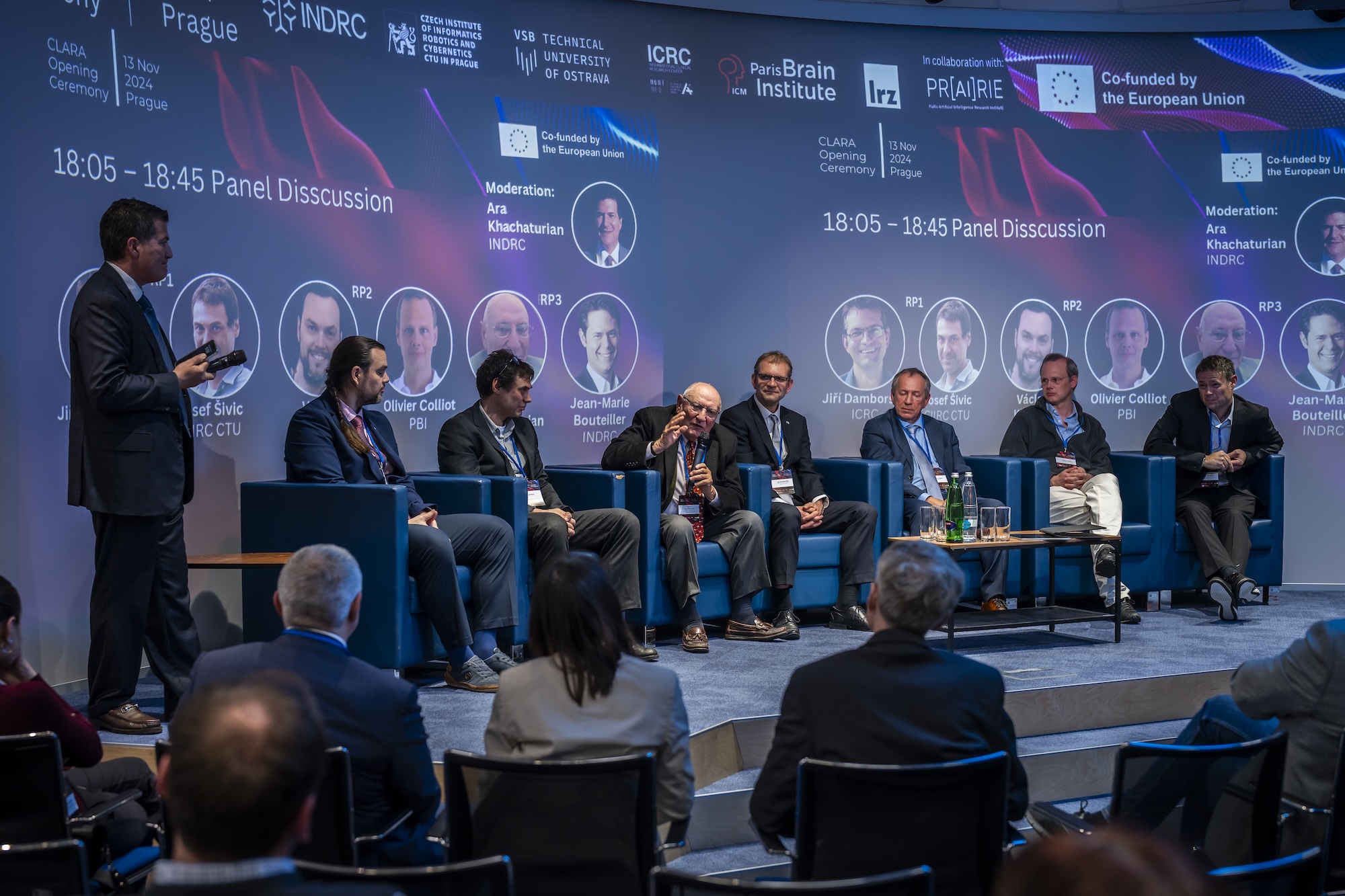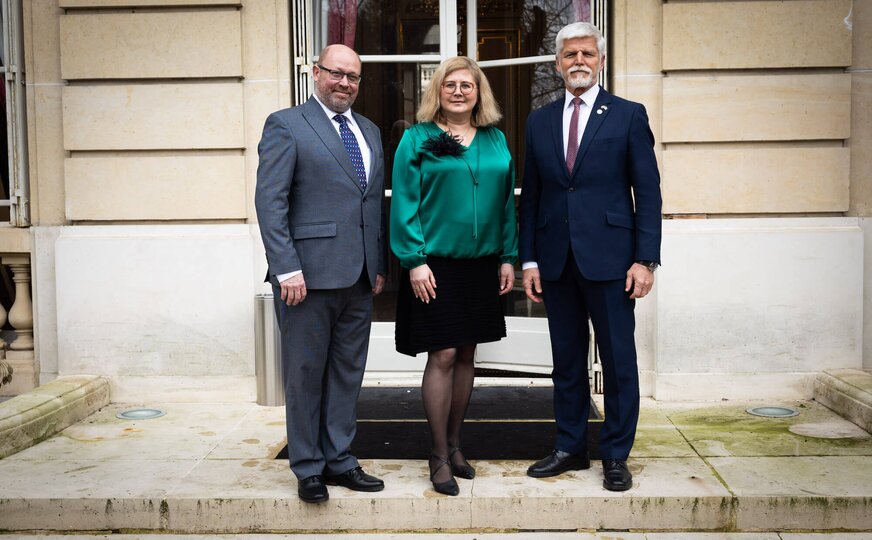The new CLARA research centre will use artificial intelligence, quantum computing methods, and supercomputers for research of neurodegenerative diseases

While current research on Alzheimer's disease and other neurodegenerative diseases focuses on studying the partial mechanisms causing neuron failure, the CLARA project brings a revolutionary approach. Scientists are asking what causes neuronal degeneration and, more importantly, what is needed to keep neurons healthy and functional for as long as possible to maintain a high quality of life. This innovative direction requires a deep understanding across different scientific domains and cannot be done without the support of advanced computational resources and artificial intelligence.
The CLARA Centre (Center for Artificial Intelligence and Quantum Computing in System Brain Research) is based on a strong consortium coordinated by the International Neurodegenerative Disorders Research Center (INDRC), and on the Czech side, it is composed of VSB – Technical University of Ostrava, the Czech Institute of Informatics, Robotics and Cybernetics (CIIRC CTU), and the International Clinical Research Center (ICRC), which is a joint workplace of St. Anne's University Hospital and the Faculty of Medicine of Masaryk University in Brno. The consortium is complemented by two major European research organisations – the French Paris Brain Institute and the German Leibniz Supercomputing Centre (LRZ) of the Bavarian Academy of Sciences and Humanities. Artificial intelligence research will be conducted in partnership with the Paris Research Artificial Intelligence Institute-School of AI (PRAIRIE-PSAI). The development of the new CLARA research and innovation infrastructure, which will be flexible and transparent and promote collaboration between scientific domains and institutions, can serve as a role model for other research centres in the Czech Republic and abroad.
Quantum computing and artificial intelligence in the service of science
The CLARA Centre will focus on research into the potential of quantum computing and artificial intelligence in conjunction with supercomputers. The aim is to study complex brain processes more effectively. These technologies will enable the analysis of large volumes of data generated from molecular research and clinical trials. By combining these approaches, scientists will gain new insights into how neurodegenerative diseases occur and be able to develop new treatments. CLARA will also significantly contribute to developing the European computational and data ecosystem in brain research.
"As the project coordinator and host organisation, INDRC will play a vital role in organising and managing the research activities. Our main task is to ensure the effective operation of the CLARA Centre of Excellence – from developing the strategic plan and managing research resources to supporting collaboration between academic institutions, clinical centres, SMEs, and non-profit organisations," said Lenka Uldrijanová, Executive Director of INDRC.
The centre builds on close cooperation with leading Czech universities and their research centres: the Czech Institute of Informatics, Robotics and Cybernetics is participating in the project on behalf of the Czech Technical University in Prague, the International Clinical Research Center contributing on behalf of Brno institutions, and IT4Innovations National Supercomputing Center is providing computational resources on behalf of VSB – Technical University of Ostrava.
"CTU will contribute expertise in artificial intelligence and machine learning in neurodegenerative diseases research within CLARA, especially through our institute. Our expertise in computing and machine learning will enable the development of advanced algorithms and systems that will be able to analyse complex brain research data and bring new insights into neurodegenerative diseases," said Prof. Vladimír Mařík, Scientific Director of the CIIRC CTU.
"Within ICRC, we will focus on clinical research and the study of biomarkers of Alzheimer's disease and enable the integration of our international study with a large cohort of participants aged 60 to 100 years, in which we are investigating the cognitive changes associated with the ageing of the human brain. Our scientists will bring to the project years of experience with molecular dynamics simulations of proteins," said Prof. Michal Masařík, Head of ICRC.
"Our role is to acquire, operate, and provide the computing infrastructure in our supercomputing centre. At the same time, we will work together to integrate quantum computing, allowing us to perform the large-scale simulations and analyses necessary to understand the complex processes of neurodegeneration," said Dr. Vít Vondrák, Managing Director of IT4Innovations.
International cooperation and benefits Europe as a whole
The importance of the CLARA project goes beyond the borders of the Czech Republic and the Central European region. The unique CLARA concept will deepen cooperation with leading research centres in the EU and the European backbone infrastructure for EuroHPC supercomputers. "Our team will focus on using artificial intelligence in medical imaging and numerical models of brain diseases. The collaboration with CLARA will allow us to develop an exciting partnership at the European level and contribute to the development of new diagnostic and prognostic tools," said Prof. Olivier Colliot, Research Director at the Paris Brain Institute and Chair Holder at the Paris Research Artificial Intelligence Institute-School of AI (PRAIRIE-PSAI). “I am highly enthusiastic about this new partnership between France and the Czech Republic. The idea of such a collaboration first emerged at the Czech-French bilateral workshop on AI in Prague in 2022. It is wonderful that this has grown to become such a large-scale project” added Prof. Isabelle Ryl, Director of PRAIRIE-PSAI.
"Large-scale simulations of neural networks such as those that the CLARA Center of Excellence is planning to carry out require enormous computing power. We are integrating supercomputers, quantum computers and artificial intelligence methods with the technical requirements of the LRZ. We are now looking forward to using our resources and expertise to help CLARA researchers gain new insights," said Prof. Dieter Kranzlmüller, Chairman of the Board of Directors of LRZ.
Moreover, CLARA opens up space for developing strategic partnerships with global initiatives in the fight against neurodegenerative diseases. It represents a significant opportunity for Czech and European research to connect to new driving currents. "We've been losing ground in the battle against neurodegenerative diseases for far too long. It's time to rethink our scientific, medical, and public health strategies to address these chronic disorders that exact such an emotional and financial toll on so many lives." said Dr. Ara S. Khachaturian, Chair of CLARA's Collegium of Experts and Chair of the INDRC, Scientific Advisory Board.
CLARA aims to discover new treatments and prevention options for neurodegenerative diseases while contributing to Europe's global challenges. The centre will drive innovation with a broad societal and economic impact. The research carried out at CLARA will be critical to developing new treatments and procedures that can improve the quality of life of millions of people worldwide.
The CLARA Centre has the potential to become a leader in the field of research into neurodegenerative diseases not only in the Czech Republic but also in Europe. Through state-of-the-art technology, interdisciplinary research, and international cooperation, CLARA will become a significant player in the global fight against diseases like Alzheimer's.
Photogallery: https://media.cvut.cz/cs/foto/20241113-clara-opening-ceremony
